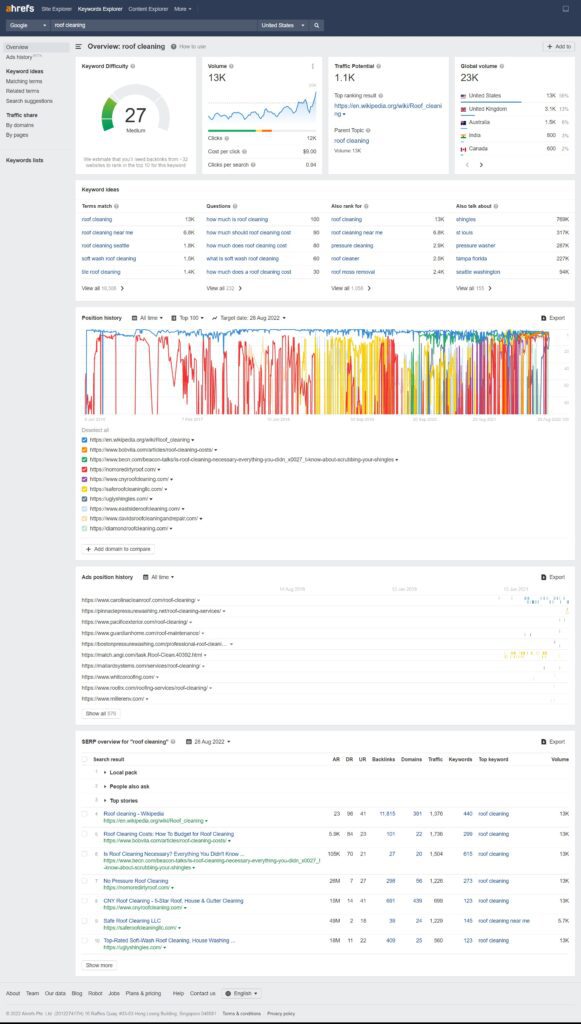Any business with an online presence needs to make sure the website is optimized for search engines. This process is called Search Engine Optimization, or SEO. But what exactly goes into an SEO audit? This article will give you a rundown of the most important elements that should be included in any comprehensive SEO audit.
What is an SEO audit?
An SEO audit is a comprehensive analysis of your website’s search engine optimization. It covers everything from your website’s structure and content to your off-page SEO efforts. The goal of an SEO audit is to identify any areas where your website could be improved in order to boost your search engine rankings.

Why do you need one?
An SEO audit is an important part of any digital marketing strategy. It can help you determine where your website ranks in search engine results pages (SERPs), identify on-page and off-page optimization opportunities, and diagnose any technical issues that may be holding your site back from ranking higher.
An SEO audit can be a complex and time-consuming process, but it’s worth the effort. By taking a comprehensive look at your website and its performance, you can make informed decisions about where to focus your time and resources to achieve the biggest impact.
What does an SEO audit include?
An SEO audit is a step-by-step assessment of your website’s search engine optimization. It includes an evaluation of your site’s technical aspects, on-page optimization, link building, and overall SEO strategy.
Keyword research

One of the most important parts of an SEO audit is keyword research. Keyword research helps you understand what people are actually searching for when they use search engines like Google. It also allows you to identify any potential keywords that you could be targeting to improve your website’s traffic. Without keyword research, it would be very difficult to improve your website’s SEO.
There are 2 Types of traffic generation methods by SEO Keywords,
1) Branded Traffic
2) Non-Branded Traffic
Check our article for – “Branded Traffic vs Non-Branded Traffic”
Also, there are different types of Keywords that should be covered while SEO Services,
1) Informational – “How to do SEO?”
2) Transactional – “Buy SEO Services”
3) Navigational – “SEO Agency London”
4) Commercial – Yudha Global
There are different types of Keywords that can be used for SEO Strategy Formation –
1) Google Keyword Planner – Free
2) Ubersuggest – Freemium
3) Keywords Tool.io – Paid
4) Ahrefs – Paid
5) SEMRush – Paid
6) Moz – Paid
7) KW Finder – Paid
Even There are different Free SEO Keyword Research Chrome Extensions available,
1) Keywords Everywhere
2) Moz Toolbar
3) Ahrefs Toolbar
4) Keyword Surfer
5) Nightwatch
On-page optimization

You should always include an analysis of your website’s on-page optimization. This is the process of making sure your website’s content and structure are optimized for search engines. There are a number of factors that go into on-page optimization, and an SEO audit will help you identify areas where your website can be improved.
On-Page SEO Audit Covers,
1) H1 – H6 Tags
2) Anchors Tags
3) Page Title, Meta Description, Meta Keywords
4) Schema Markup Code
5) Social Share Image Placement
6) Cache Setup
7) Optimized Image/Video Sizes
8) Broken Links
9) Call to action Setup
10) Page Interlinings Setup
11) Content Strategy
12) Check Thin Contents and Fix them
Link building and backlinks
One of the most important aspects of SEO is link building and backlinks. Link building is the process of creating links from other websites to your own website. Backlinks are links that point from other websites back to your website.
Link building and backlinks are important because they help improve your website’s search engine ranking. The more links you have pointing to your website, the higher your website will rank in the search results. Additionally, backlinks can also help bring traffic to your website. But during SEO Audit, we can check out,
1) Spam Backlinks
2) Broken Backlinks
3) Competitors Backlinks
Technical SEO

An SEO audit also includes a technical analysis of your website to identify any potential obstacles to search engine optimization. The most common issues that are uncovered in SEO Optimization include problems with site structure, content, and link building. By identifying these problems, you can make the necessary changes to improve your website’s ranking in search engines.
It’s Important nowadays that your Technical SEO should be more focused while doing SEO,
1) Page URL
2) Sitemap
3) Robots.Txt
4) HTTPS Version of site
5) Website should be Fast Loading
6) Website must be Mobile Friendly
7) Your Image Size should be Optimized
8) Canonical URL Fix
9) Fix Crawl Issue
10) Fix Broken Internal & External Link
11) Check Page Depth
12) Setup 301 Redirection
13) Fix Google Search Console Errors
Mobile SEO
One of the key components of an SEO audit is assessing the website’s mobile friendliness. In today’s world, more and more people are using their mobile devices to access the internet. This means that it’s absolutely essential for businesses to have a website that is mobile-friendly.
If a website is not optimized for mobile, it will likely lose out on a lot of potential traffic and customers. During an SEO audit, we will carefully examine your website to see how well it performs on mobile devices. We will also offer recommendations on how to improve the mobile experience for your website visitors.
Check your website Mobile Friendly Test using –
Local SEO
A local SEO audit is specifically focused on optimizing a website to rank well in local search results. This includes optimizing your website for local keywords, as well as making sure your NAP (name, address, and phone number) is consistent across the web.
If you’re looking to improve your local SEO, an audit is a great place to start. By identifying areas of improvement, you can focus your efforts on the tasks that will have the biggest impact.
Local SEO is an Important SEO Strategy if you want to focus on a specific Area City or Country
1) Check your Google Business Page
2) Check your Local Listings Site like Facebook Page, Foursquare, BBB, Trustpilot, Manta, Hot frog, etc.
3) Check and Fix if the contact, or address is not correct
International SEO
An international SEO audit is even more comprehensive, as it takes into account the unique challenges and opportunities of ranking in multiple countries. This type of audit is essential for any business with a global audience.
International SEO works differently and should be taken care of –
1) Check your Href Tags
2) Check your Target Country Setup
3) Have Long Tail Keywords
4) Check Subdomains and Page URL
5) Check if any 404 Page Error there
6) Blog article publishing strategy
User experience (UX)
An SEO audit is not complete without a review of your blog section. This is because your blog is a key part of your website’s user experience (UX). A good UX is essential for keeping visitors on your site and reducing your bounce rate.
Your blog should be easy to navigate, with a clear hierarchy and structure. The design should be clean and uncluttered, and the content should be well-written and relevant to your target audience.
In addition to these general guidelines, there are a few specific things to look for when auditing your blog:
- Make sure all of your blog posts are being indexed by Google. You can check this using the Google Search Console.
- Check that your blog posts are being shared on social media. If they’re not, consider adding social sharing buttons to make it easier for readers to share your content.
- Use Google Analytics to see which of your blog posts are getting the most traffic. Review these posts to see what makes them successful, and apply these lessons to future posts.
Conclusion
After reading this article, you should now have a good understanding of what an SEO audit is and what it entails. By conducting an SEO audit on your website, you can identify any areas that need improvement in order to rank higher on search engine results pages. If you’re not sure where to start, consider hiring an experienced SEO consultant to help you out.



